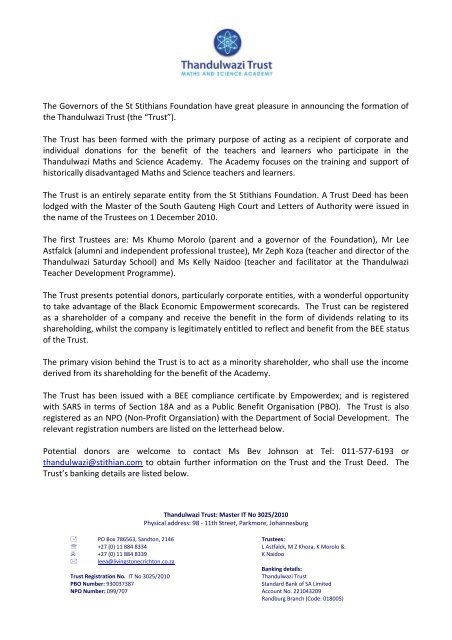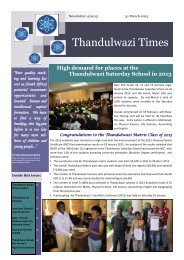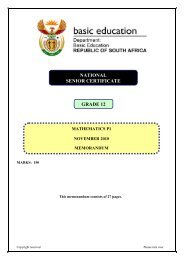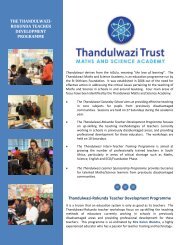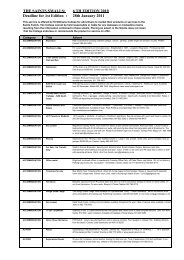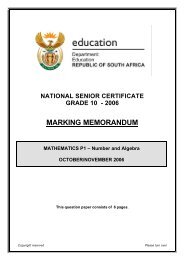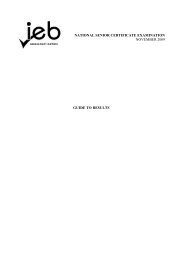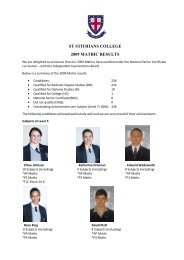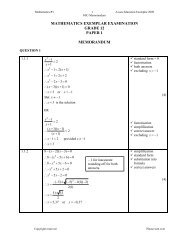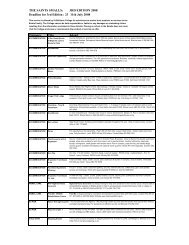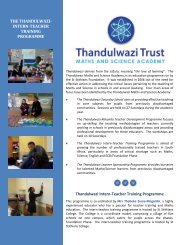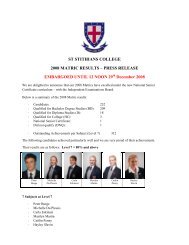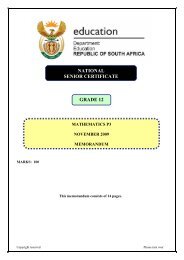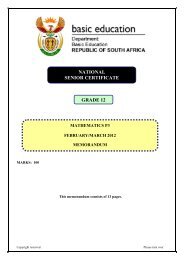Foundation Letterhead - St Stithians College
Foundation Letterhead - St Stithians College
Foundation Letterhead - St Stithians College
Create successful ePaper yourself
Turn your PDF publications into a flip-book with our unique Google optimized e-Paper software.
The Governors of the <strong>St</strong> <strong>St</strong>ithians <strong>Foundation</strong> have great pleasure in announcing the formation of<br />
the Thandulwazi Trust (the “Trust”).<br />
The Trust has been formed with the primary purpose of acting as a recipient of corporate and<br />
individual donations for the benefit of the teachers and learners who participate in the<br />
Thandulwazi Maths and Science Academy. The Academy focuses on the training and support of<br />
historically disadvantaged Maths and Science teachers and learners.<br />
The Trust is an entirely separate entity from the <strong>St</strong> <strong>St</strong>ithians <strong>Foundation</strong>. A Trust Deed has been<br />
lodged with the Master of the South Gauteng High Court and Letters of Authority were issued in<br />
the name of the Trustees on 1 December 2010.<br />
The first Trustees are: Ms Khumo Morolo (parent and a governor of the <strong>Foundation</strong>), Mr Lee<br />
Astfalck (alumni and independent professional trustee), Mr Zeph Koza (teacher and director of the<br />
Thandulwazi Saturday School) and Ms Kelly Naidoo (teacher and facilitator at the Thandulwazi<br />
Teacher Development Programme).<br />
The Trust presents potential donors, particularly corporate entities, with a wonderful opportunity<br />
to take advantage of the Black Economic Empowerment scorecards. The Trust can be registered<br />
as a shareholder of a company and receive the benefit in the form of dividends relating to its<br />
shareholding, whilst the company is legitimately entitled to reflect and benefit from the BEE status<br />
of the Trust.<br />
The primary vision behind the Trust is to act as a minority shareholder, who shall use the income<br />
derived from its shareholding for the benefit of the Academy.<br />
The Trust has been issued with a BEE compliance certificate by Empowerdex; and is registered<br />
with SARS in terms of Section 18A and as a Public Benefit Organisation (PBO). The Trust is also<br />
registered as an NPO (Non-Profit Organsiation) with the Department of Social Development. The<br />
relevant registration numbers are listed on the letterhead below.<br />
Potential donors are welcome to contact Ms Bev Johnson at Tel: 011-577-6193 or<br />
thandulwazi@stithian.com to obtain further information on the Trust and the Trust Deed. The<br />
Trust’s banking details are listed below.<br />
Thandulwazi Trust: Master IT No 3025/2010<br />
Physical address: 98 - 11th <strong>St</strong>reet, Parkmore, Johannesburg<br />
PO Box 786563, Sandton, 2146 Trustees:<br />
+27 (0) 11 884 8334 L Astfalck, M Z Khoza, K Morolo &<br />
+27 (0) 11 884 8339 K Naidoo<br />
leea@livingstonecrichton.co.za<br />
Banking details:<br />
Trust Registration No. IT No 3025/2010<br />
Thandulwazi Trust<br />
PBO Number: 930037387<br />
<strong>St</strong>andard Bank of SA Limited<br />
NPO Number: 099/707 Account No. 221043209<br />
Randburg Branch (Code: 018005)
THANDULWAZI MATHS & SCIENCE ACADEMY<br />
BEE and Income Tax deductions<br />
Broad-Based Black Economic Empowerment<br />
In order to address the legacy of apartheid the South African Government has adopted a strategy to<br />
transform South African business (and society as a whole) for the long-term sustainable development of the<br />
country. The Government has introduced the Broad-Based Black Economic Empowerment Policy (BEE),<br />
aimed at rectifying one of the most unequal distributions of wealth in the world; gender and racial<br />
disparities in education and skills levels; and the under-development of black and rural communities.<br />
Societies characterised by entrenched gender inequality or racially/ ethnically defined wealth disparities<br />
are not likely to be socially and politically stable, particularly as economic growth can easily exacerbate<br />
these inequalities. Seen in this context, BEE is a vitally important policy in the development of our country.<br />
Thandulwazi is committed to the transformation of education and there is substantial alignment between<br />
the objectives of BEE and the activities undertaken by the Thandulwazi Maths & Science Academy. There<br />
seems to be no doubt at all of the vital necessity to redress the educational inequalities that arose during<br />
the apartheid era and which still visibly underpin and “haunt” today’s school system.<br />
While the transfer of ownership and control of a portion of the economy to black people is a significant part<br />
of the BEE policy, it is only one aspect of the policy. BEE is also about ensuring that the people who work in,<br />
manage and lead businesses broadly reflect the diverse profile of the South African population, requiring<br />
skills be transferred to persons previously disadvantaged by the system of apartheid. The development of<br />
black-owned enterprises and the socio-economic development of the black section of our community seek<br />
to deracialise the South African economy and fast track marginalised communities into the mainstream.<br />
The definition of who should benefit from BEE is described as “Historically Disadvantaged South Africans”<br />
(HDSAs), and includes “Africans, Coloureds and Indians”.<br />
A set of “Codes of Good Practice” was published in February 2007. These Codes form the basis for<br />
measuring BEE. A “scorecard” approach is used in assessing BEE, giving points to the different aspects of<br />
BEE. The Codes provide a standard/ generic framework for the measurement of broad-based BEE across all<br />
sectors of the economy, and there are some industry-specific arrangements (charters) that may modify the<br />
standard framework. The Generic Scorecard awards points amounting to a total of 100 on the seven<br />
elements of: ownership (20 points), management control (10), employment equity (15), skills development<br />
(15), preferential procurement (20), enterprise development (15) and socio-economic development (5).<br />
The measurement of the Ownership element quantifies the effective ownership of the enterprise by<br />
HDSAs. The Socio-Economic Development element measures the extent to which enterprises carry out<br />
initiatives aimed at contributing to socio-economic development and promoting access to the economy for<br />
black people.<br />
2
Ownership is measured as an entitlement to both voting rights and economic ownership. An overall target<br />
of 25 percent plus one vote by HDSAs is set for the ownership element. The Thandulwazi Trust will provide<br />
full BEE benefit in terms of ownership points. The Thandulwazi Trust is currently in the process of having its<br />
BEE status audited and a rating certificate by an accreditation agency will be available to verify this.<br />
The Socio-Economic Development element is allocated five points on the Generic Scorecard. The target is<br />
one percent of the entity’s net profit after tax (or as an alternative 0.125% of turnover), being contributions<br />
to beneficiaries where at least 75 percent of the value directly benefits HDSAs.<br />
The Thandulwazi Maths and Science Academy beneficiaries are 100% HDSAs and therefore donations to<br />
Thandulwazi qualify fully in respect of the Socio-Economic Development element of the BEE scorecard.<br />
Deduction of donations for tax purposes<br />
Section 18A of the Income Tax Act provides for the tax deductibility of donations made to approved public<br />
benefit organisations. A taxpayer making a bona fide donation is entitled to a deduction from his taxable<br />
income if the donation:<br />
is supported by the necessary receipt issued by the organization; and<br />
does not exceed 10% of the donor’s taxable income (certain technical quantification issues in respect of<br />
individuals).<br />
A bona fide donation is a gratuitous donation or gift disposed of by the donor out of liberality or generosity.<br />
It is a voluntary gift which is freely given to the donee, with no quid pro quo, no reciprocal obligations and<br />
no personal benefit for the donor. The donor may not impose conditions which could enable him or any<br />
connected person in relation to himself to derive some direct or indirect benefit from the application of the<br />
donation. The donation may not be revocable by the donor. The donation must actually be paid or<br />
transferred during the year of assessment.<br />
Donations to Thandulwazi qualify for income tax deduction (subject to the 10% limit) in terms of Section<br />
18A and a valid tax receipt will be provided to donors to evidence the donation.<br />
Acknowledgements:<br />
Bowman Gilfillan BEE guide<br />
SARS - Tax Exemption Guide for Public Benefit Organisations in South Africa<br />
3
CONTACT DETAILS<br />
Physical address: 40 Peter Place, Lyme Park, Sandton<br />
Private Bag 2, RANDBURG 2125, South Africa<br />
+27 (0) 11 577-6193<br />
+27 (0) 11 577-6478<br />
thandulwazi@stithian.com<br />
List of Thandulwazi Trustees<br />
Lee Astfalck, Mahlathi Khoza, Khumo Morolo, Kelly Naidoo<br />
List of Directors<br />
<strong>St</strong> <strong>St</strong>ithians <strong>Foundation</strong> Director & Thandulwazi Co-ordinator – Bev Johnson<br />
Thandulwazi Teacher Development Programme – Karen Walstra<br />
Thandulwazi Saturday School – Mahlathi Khoza<br />
Thandulwazi Intern-Teacher Programme – Thobeka Zuma-Mngambi<br />
List of <strong>St</strong> <strong>St</strong>ithians <strong>Foundation</strong> Governors<br />
Peter Backwell, Kelly Brimacombe, Brett Kinmont, Ntombi Langa-Royds, <strong>St</strong>ephen Lowry, Khumo Morolo,<br />
Peter van Beek, Andrew Watt & Sarah Wharton-Hood<br />
Nature of Legal Registration of the Organisation<br />
Registered Educational Trust – Thandulwazi Trust - Registration No. IT 3025/2010<br />
PBO No. 930037387<br />
NPO No. 099/707<br />
Section 18A <strong>St</strong>atus<br />
Approved educational trust in terms of Section 18A of the Income Tax Act<br />
Trust Income Tax Reference No. 0772994182<br />
Banking details<br />
Account Name: Thandulwazi Trust<br />
Account Number: 221043209<br />
Bank:<br />
<strong>St</strong>andard Bank<br />
Branch:<br />
Randburg<br />
Branch code: 018005<br />
4


